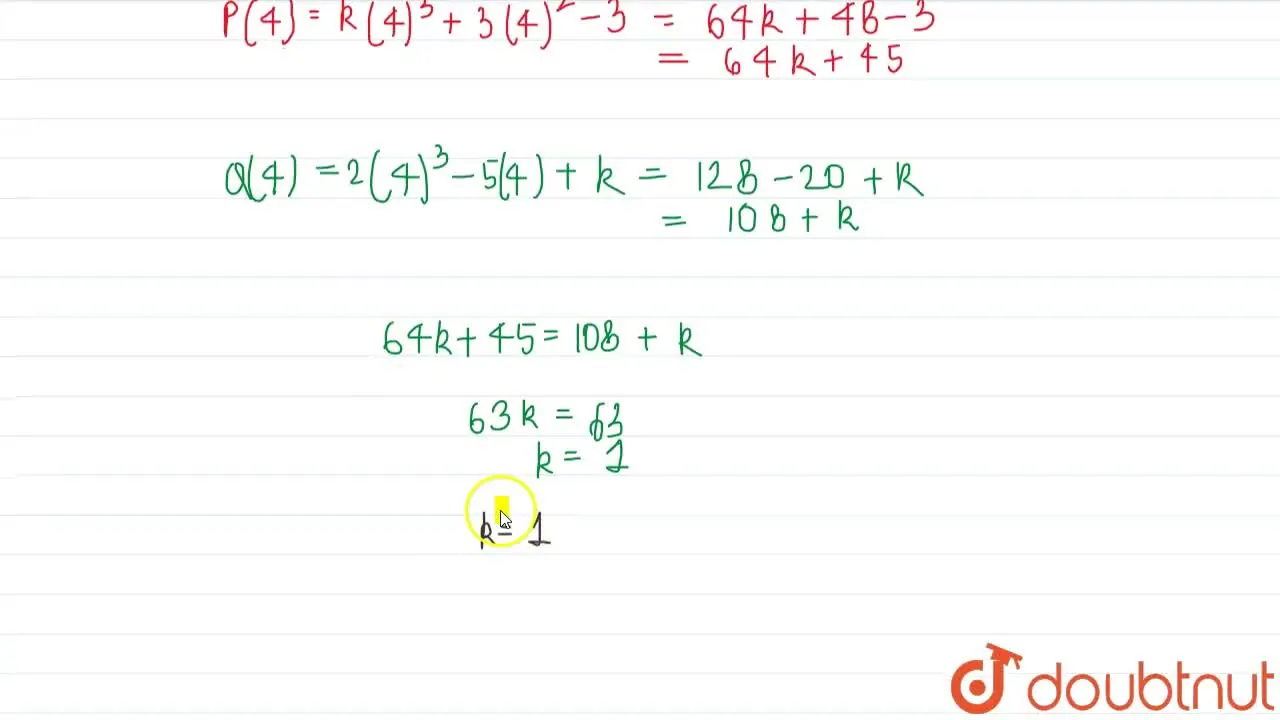If a is defined by f (x)=a0xn+a1xn−2+a2xn−2+...+an−1x+an where n is a non negative integer and a0,a1,a2,…….,an are real numbers and a0≠0, then f is called a polynomial function of degree n. For polynomials we can define the following theorem
(i) Remainder theorem: Let p(x) be any polynomial of degree greater than or equal to one and 'a' be a real number. if p(x) is divided by (x-a), then the remainder is equal to p(a).
(ii) Factor theorem : Let p(x) be a polynomial of degree greater than or equal to 1 and 'a' be a real number such that p(a) = 0, then (x-a) is a factor of p(x). Conversely, if (x-a) is a factor of p(x). then p(a)=0.
THe polynomials P(x)=kx3+3x2−3andQ(x)=2x3−5x+k, when divided by (x−4) leave the same remainder. Then the value of k is
2
1
0
−1
Step by step video & image solution for If a is defined by f (x)=a_(0)x^(n)+a_(1)x^(n-2)+a_(2)x^(n-2)+...+a_(n-1)x+a_(n) where n is a non negative integer and a_(0),a_(1),a_(2),…….,a_(n) are real numbers and a_(0) ne 0, then f is called a polynomial function of degree n. For polynomials we can define the following theorem (i) Remainder theorem: Let p(x) be any polynomial of degree greater than or equal to one and 'a' be a real number. if p(x) is divided by (x-a), then the remainder is equal to p(a). (ii) Factor theorem : Let p(x) be a polynomial of degree greater than or equal to 1 and 'a' be a real number such that p(a) = 0, then (x-a) is a factor of p(x). Conversely, if (x-a) is a factor of p(x). then p(a)=0. THe polynomials P(x) =kx^(3)+3x^(2)-3 and Q(x)=2x^(3) -5x+k, when divided by (x-4) leave the same remainder. Then the value of k is by Maths experts to help you in doubts & scoring excellent marks in Class 12 exams.
Related Playlists
Similar Questions
If a is defined by f (x)=a0xn+a1xn−2+a2xn−2+...+an−1x+an where n is a non negative integer and a0,a1,a2,…….,an are real numbers and a0≠0, then f is called a polynomial function of degree n. For polynomials we can define the following theorem
(i) Remainder theorem: Let p(x) be any polynomial of degree greater than or equal to one and 'a' be a real number. if p(x) is divided by (x-a), then the remainder is equal to p(a).
(ii) Factor theorem : Let p(x) be a polynomial of degree greater than or equal to 1 and 'a' be a real number such that p(a) = 0, then (x-a) is a factor of p(x). Conversely, if (x-a) is a factor of p(x). then p(a)=0.
The remainder when the polynomial P(x)=x4−3x2+2x+1 is divided by x−1 isView SolutionIf a is defined by f (x)=a0xn+a1xn−2+a2xn−2+...+an−1x+an where n is a non negative integer and a0,a1,a2,…….,an are real numbers and a0≠0, then f is called a polynomial function of degree n. For polynomials we can define the following theorem
(i) Remainder theorem: Let p(x) be any polynomial of degree greater than or equal to one and 'a' be a real number. if p(x) is divided by (x-a), then the remainder is equal to p(a).
(ii) Factor theorem : Let p(x) be a polynomial of degree greater than or equal to 1 and 'a' be a real number such that p(a) = 0, then (x-a) is a factor of p(x). Conversely, if (x-a) is a factor of p(x). then p(a)=0.
The factor of the polynomial x3+3x2+4x+12 is
(1)x+3 (2)x−3 (3)x+2 (4)x−2View SolutionIf a is defined by f (x)=a0xn+a1xn−2+a2xn−2+...+an−1x+an where n is a non negative integer and a0,a1,a2,…….,an are real numbers and a0≠0, then f is called a polynomial function of degree n. For polynomials we can define the following theorem
(i) Remainder theorem: Let p(x) be any polynomial of degree greater than or equal to one and 'a' be a real number. if p(x) is divided by (x-a), then the remainder is equal to p(a).
(ii) Factor theorem : Let p(x) be a polynomial of degree greater than or equal to 1 and 'a' be a real number such that p(a) = 0, then (x-a) is a factor of p(x). Conversely, if (x-a) is a factor of p(x). then p(a)=0.
The number of real roots of the equation, (x−1)2+(x−2)2+(x−3)2=0 isView SolutionDifferentiate |x|+a0xn+a1xn−1+a2xn−1+...+an−1x+an
View SolutionIf a1,a2,….,an are n(>1) real numbers, then
View SolutionIf A1,A2,..,An are any n events, then
View Solution(1+x)n=a0+a1x+a2x2+......+anxn then
Find the sum of the series a0+a2+a4+……View SolutionConsider (1+x+x2)n=2n∑r=0arxr,where a0,a1,
a2,…a2n are real numbers and n is a positive integer.
The value of a2 isView SolutionLet n∈N. If (1+x)n=a0+a1x+a2x2+…….+anxn and an−3,an−2,an−1 are in AP, then :
View SolutionLet a1,a2…,an be a non-negative real numbers such that a1+a2+…+an=m and let S=∑i<jaiaj, then
View Solution


